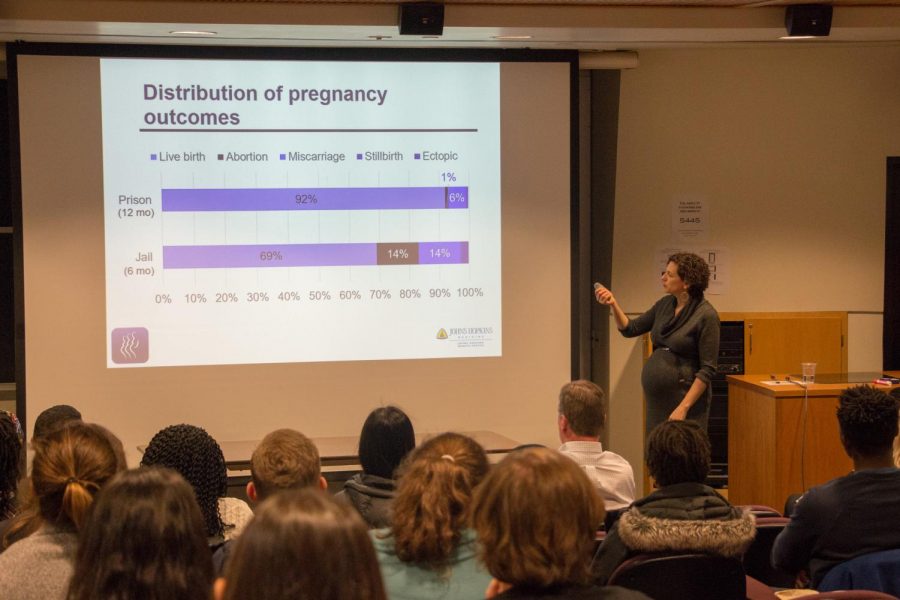Dr. Carolyn Sufrin, a graduate of Amherst College and recent recipient of the Pryde Award, an honor presented to successful alumni who specialize in the chemistry field, presented a lecture entitled “Pregnant Behind Bars: Challenges and Opportunities in Health Care and Social Justice” at the Amherst College Merrill Science Center on March 23.
While working in her first year of residency in the obstetrics and gynecology department at Magee-Women’s Hospital in Pittsburgh, Sufrin encountered an experience that would shape the remainder of both her medical career and life purpose. Her patient in labor was shackled to the hospital bed by her arms and pelvis area in agony.
Sufrin’s immediate thoughts were, “How am I supposed to do my job safely with these shackles? What is it like for this woman? Can I ask this guard who has a weapon around his belt to remove the shackles?”
The mother giving birth was a criminal from the local prison.
After completing her residency, Sufrin moved to San Francisco to do a fellowship in family planning at the University of California San Francisco. Compelled by her previous encounter with pregnant prisoners, Sufrin shortly began working as the clinic doctor for the San Francisco Women’s Jail, finding that this was “a very profound experience.”
According to the U.S. Bureau of Justice Statistics, Sufrin researched that out of the 2.6 million women arrested every year, 219,000 of them are placed behind bars. Of those 219,000 women, 62 percent of them 18 years and older are mothers or primary caregivers. Over the past four decades, women have been the fastest growing rate of increase of sub population incarceration.
The majority of these women shared a common factor of suffering from prior homelessness, poverty, poor access to healthcare, unemployment, trauma, substance abuse or mental illness. According to Sufrin’s research, up to 80 percent of incarcerated women have experienced some form of physical or sexual abuse. “All of these factors have caused these women to become trapped within the legal system,” explained Sufrin.
Despite incarcerated individuals being the only individuals in the U.S. that have mandated health care, Sufrin found that healthcare for pregnant prisoners varied greatly from state to state.
There are no mandatory standards or oversight specifically for the unique healthcare needs of pregnant woman prisoners. According to a position paper from the American Academy of Family Physicians, the privatization of many prisons has caused the care that these pregnant women do receive to be inadequate; there is tremendous discretionary power as to what is a necessary medical need and what is not.
There is a lack of transparency in the statistics of incarcerated pregnant women, which is something Sufrin strives to fix.
While conducting research, Sufrin asked prison health care providers, “Do incarcerated women have the legal right to abortion?” In theory, women have the constitutional right to obtain an abortion. But in practice, only 68 percent of women can obtain abortions while incarcerated. Unique logistical challenges that may prevent a prisoner from obtaining an abortion include payment issues, court orders, proximity to abortion provider and state regulations.
Some jails and prisons require the woman to pay for the procedure herself, due to her Medicare or health care getting suspended if imprisoned.
In her presentation, Sufrin declared that 38 states have inadequate prenatal care. Additionally, there is a substandard treatment of opioid use disorder in this group of women; they should not be detoxed while pregnant due to withdrawal symptoms that may hurt both the mother and child.
In jails or prisons where incarceration for women is deemed acceptable, these women receive “special privileges” which include a bottom bunk and an extra sandwich or carton of milk during meals.
Sufrin expressed that there is a neglect of women’s specific healthcare needs from supervising jail correctional staff. “These guards aren’t appropriately trained and don’t have the appropriate resources,” Sufrin argued.
However, the biggest conflict of pregnant incarcerated women is the use of shackles during labor. From a custody perspective, restraints are used due to the issue of safety and security. Sufrin argued that the chances of a woman in labor fighting back during contractions is pretty slim. The use of an epidural would numb the woman from the waist down would prevent her from running away. The restraints pose a threat to both the mother and fetus’ health and the restraints are dehumanizing.
There are currently only 22 states and the District of Columbia which prohibit shackling in labor.
“Something I found really interesting was the amount of preterm births, and how the average rate of preterm babies in the prison systems was actually lower than that outside the jail system,” said Kendall Melvin, an Amherst College graduate and current post factory sutures and lab manager under Dr. Sheila Jaswal.
Leonard Yoon, a senior chemistry major at Amherst College, was astonished by the lecture. “I really had no idea about the disparity in women’s health that occurs in incarcerated populations. I’m glad that this was brought to my attention.”
Sufrin continues advocating for these women through her new study entitled, “Pregnancy Decision Making in Correctional Settings.”
Gretchen Keller can be reached at [email protected] and followed on Twitter at @gretchenkellerr.




















